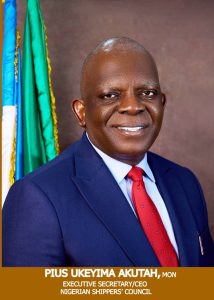
Maritime Stakeholders are becoming increasingly apprehensive over the seeming delay in the Presidential assent to the Ports and Shipping Economic Regulation Agency Bill which was passed by both chambers of the National Assembly over a year ago. The Bill seeks to repeal the existing Nigerian Shippers’ Council Act and aims to establish a more robust and effective regulatory framework to support the growth of Shipping and Ports sectors ,while safeguarding the interest of Nigerian Shippers.
 In the main, the Bill proposes the creation of the Nigerian Shipping and Ports Regulatory Agency, which is tasked with achieving an ambitious objective to create a more efficient and competitive environment for both the public and private sector in the shipping and Ports sector. One of the key provisions of the Bill is expanding the powers and functions of the Nigerian Shippers by granting the new Agency broader authority. This includes empowering the Agency to set and enforce service standards,tariffs,and licensing requirements for public and private sector players referred to in the Bill as Regulated Service Providers. Like in previous attempts, this is the clause that is generating ripples among sister agencies in the Marine and Blue Economy Ministry ,fighting for supremacy. This is despite the conscious effort made by the Minister of Marine and Blue Economy, Adegboyega Oyetola, to ensure that all areas of conflict and overlapping functions amongst agencies are resolved.
In the main, the Bill proposes the creation of the Nigerian Shipping and Ports Regulatory Agency, which is tasked with achieving an ambitious objective to create a more efficient and competitive environment for both the public and private sector in the shipping and Ports sector. One of the key provisions of the Bill is expanding the powers and functions of the Nigerian Shippers by granting the new Agency broader authority. This includes empowering the Agency to set and enforce service standards,tariffs,and licensing requirements for public and private sector players referred to in the Bill as Regulated Service Providers. Like in previous attempts, this is the clause that is generating ripples among sister agencies in the Marine and Blue Economy Ministry ,fighting for supremacy. This is despite the conscious effort made by the Minister of Marine and Blue Economy, Adegboyega Oyetola, to ensure that all areas of conflict and overlapping functions amongst agencies are resolved.
It is on record that Oyetola inaugurated an inter ministerial committee headed by Mr Oluwafemi Oloruntola, Permanent Secretary in the Ministry to fine tune all grey areas that may hinder the easy passage of the Bill. The Committee had representatives from the Nigerian Shippers Council, Nigerian Maritime Administration and Safety Agency , Nigerian Ports Authority, National Inland Waterways Authority and the Maritime Academy of Nigeria. The outcome of the decisions of this committee formed the official position of the Ministry which was forwarded to both chambers of the National Assembly. However, while the Bill promises substantial benefits, it has continued to raise potential concerns about overlapping regulatory functions and possible conflicts with existing agencies. As in the past, there is an intense power play at the Presidency, which investigations revealed may be the reason behind the seeming delay in the Presidential assent. A recent indication to this effect which was confirmed by usually dependable sources at the Presidency resulted in a red flag being raised at the point of Mr President’s assent.
This development it was learned, led to the withdrawal of the Bill at Presidency to allow for more legal inputs which were not envisaged in the original Bill forwarded to President Bola Tinubu for his assent. It is however not known if at the time this column went to bed, those queries have been answered. The specific questions raised in Bill have not been made public. Nigeria’s Shipping Industry plays a significant role in the economic emancipation of the nation by influencing the pace of growth in other sectors . The industry has a great potential to generate huge revenue being a goldmine with the capacity to influence economic growth, but sadly it is the only sector without an economic regulator.

